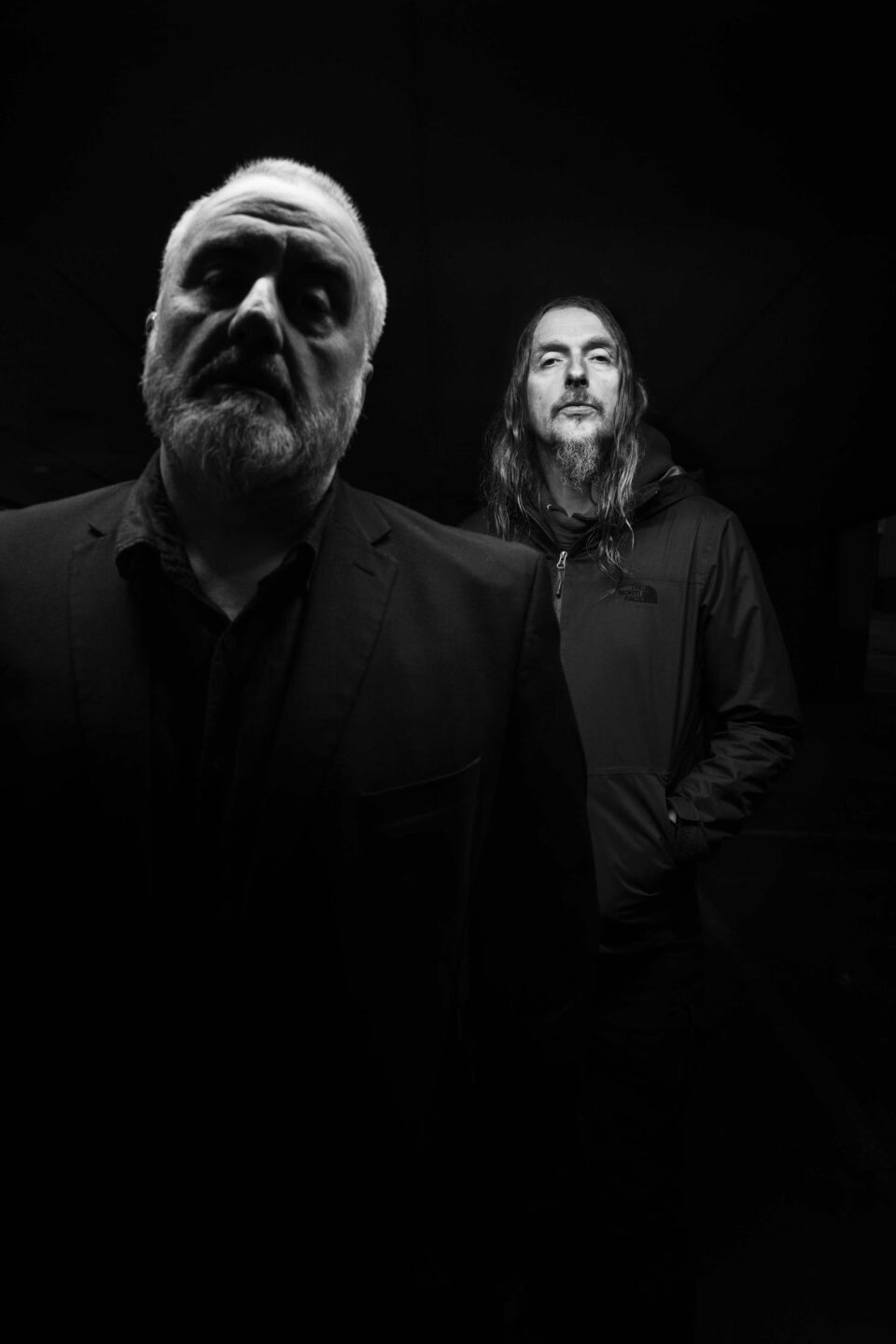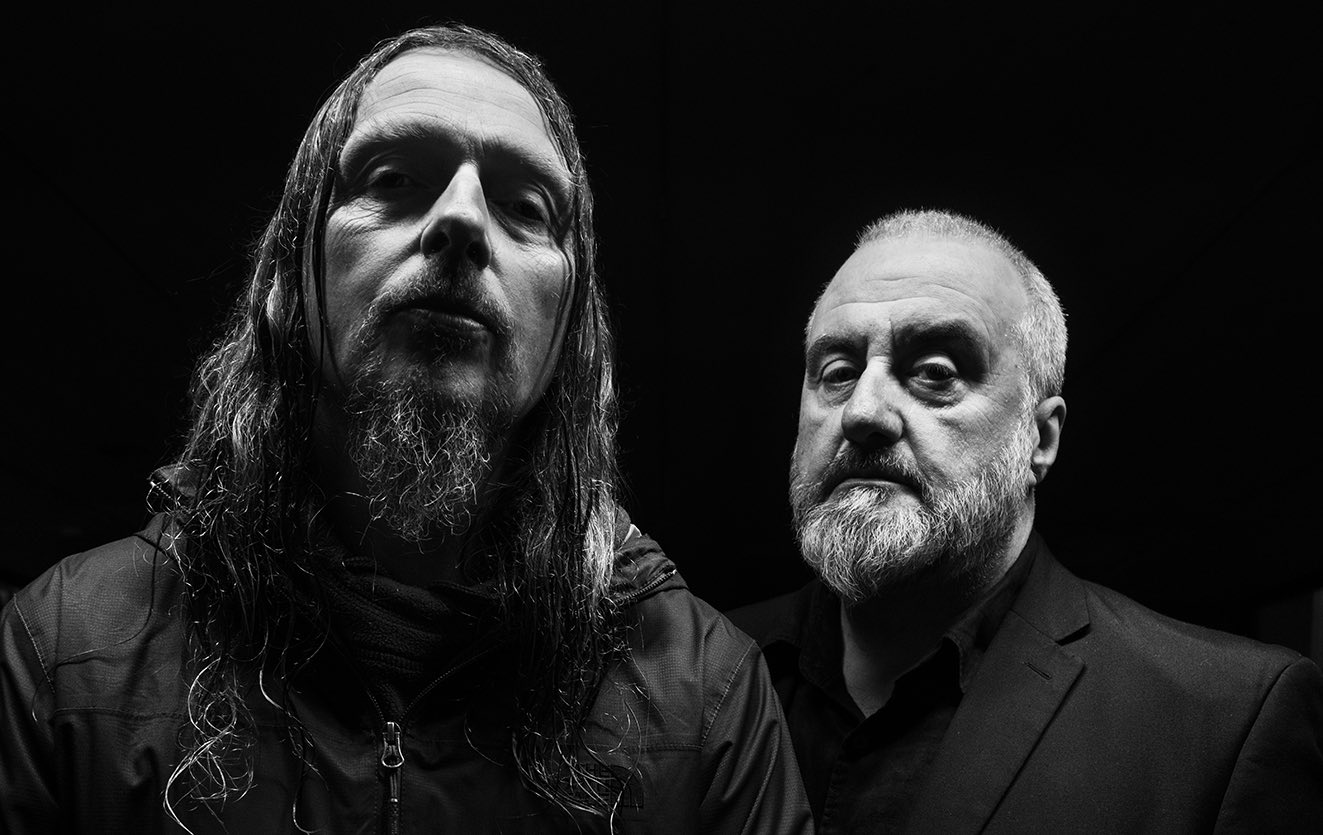Justin K. Broadrick is among the most esteemed musicians in the contemporary heavy music underground, an exclusive club that embraced him and his Godflesh bandmate B. C. Green shortly after their first full-length, 1989’s Streetcleaner, shook the scene. Since then, Godflesh has risen to the level of untouchable artists who get deference from all fans of heavy music. Broadrick and Green are so metal, in fact, that they don’t need to prove their heavy-rock bonafides to genre purists—or anyone else, for that matter. In other words, to Broadrick, image isn’t everything. “My WhatsApp photo is a kitten with tears in its eyes with a cowboy hat on,” he unabashedly admits over the phone. “No one says a single fucking thing, which I find really interesting. Nobody knows how to take it.”
Godflesh is very familiar with pedestrian and even seasoned music fans not understanding the band’s music—it’s the story of Godflesh’s career, in a sense. Challenging the listener musically while simultaneously allowing Broadrick to undergo his musical cleansing of sorts through songwriting, Godflesh aren’t, nor have they ever been, out to satisfy anyone but themselves.
Broadrick—who lives in the British countryside and has a son who just turned 12—even confesses that he’d rather not be around people at all most of the time. “Over half of my life now, I’ve lived in isolated country environments—and it absolutely suits me entirely,” he says. “This is where I’m happiest. I can at least exist more peacefully and feel less external shit by living where I can look out my window and just see trees and no people.” Broadrick delves deeper into nature by taking long solo walks, but even those can frustrate him and fail to quiet his brain. “My mind just circles around things to distress myself about, and I’m like, ‘For fuck’s sake, this is meant to be a peaceful walk.’”
Broadrick is perpetually anxious, and he candidly expresses why during our conversation. The guitarist/vocalist was diagnosed with severe autism last year, a condition which led to a second health issue, post-traumatic stress disorder, upon “being exposed to a lifestyle that did not at all cater to [his] conditions” throughout his youth. As someone with autism, Broadrick craves structure and fears overstimulation (if you’ve seen Godflesh live, you’ve probably noticed scarce lighting onstage).
“I feel the same now at the age of 53 as I did when I was 13. With autism, emotionally, you’re pretty much almost the same as you were as a kid. It’s quite barbaric and a fucking curse.”
Additionally, he’s always found cities—lately introducing and embracing loads of panoramic screen technology—too overwhelming for him. In turn, that led Broadrick to self-isolate. “I became quite self-obsessive,” he reflects on living with autism and PTSD. “I often say to people, ‘I’ve got 20 ways of saying the same thing.’ I’m very slow to digest, very slow to absorb. And once I capture something, I often feel like I haven’t really sufficiently explained myself. I think that’s because [another] autism [symptom is being] constantly misunderstood.”
Since time immemorial, self-expression is reason enough for artists to undertake endeavors like music, painting, and writing. Broadrick says the new Godflesh album refers to how he’s scraping off barnacles of bad thoughts by purging them from his psyche. Hence the new album’s title, Purge, which actually has a couple of songs that capture Godflesh the closest they’ll get to mainstream: “Land Lord” and “Army of Non.” “These tracks have got definite grooves. There’s a couple of ’90s hip hop-grooves I’ve been hanging onto forever,” Broadrick says. “We wanted to add a bit of a ’90s UK drum ’n’ bass, too.”
Further commenting on Purge, Broadrick makes another surprising admission: He believes he hasn’t “learned a damn thing about writing. I feel the same now at the age of 53 as I did when I was 13,” the self-taught musician says. “[With] autism, emotionally, you’re pretty much almost the same as you were as a kid. It’s quite barbaric [and] a fucking curse.”

“My creative process is not born from entertainment. It’s absolutely nonstop and a transcendent experience. This is why I’m alive.”
Curse aside, Broadrick continues to push forward and has loads of unreleased material he recorded or dug up during COVID, which he’s slowly been putting out under his various monikers—from the somber shoegaze of jesu, to the dark-ambient drone of Final, to the industrial dance music of JK Flesh. He’s also embracing technology, dispelling the notion that just because he lives in the countryside that he must be a Luddite.
Actually, Broadrick is so engaged with technology now that he often records riffs or ditties into his phone for later consideration. “I remember being in an environment once with my son, and there was a trampoline, and they were playing really crass trance music,” he recalls. “And there was some, like, breakdown in the middle of some trance song. I felt quite emotional, very sensitive to my environment at the time. It was absolute sensory overload, and I was very emotional because of it.
“Then I heard this really god-awful song,” he continues, chuckling, “an absolute piece of shit. I recorded it on my phone, replayed it, I think I reversed it, pitched it down, filtered it, put it through a number of effects—and it became a lead motif on a jesu song.” He qualifies: “The shame is I lose about 50 percent of sampling ideas due to just not being able to record the moment.”
“My family and my creativity—there’s very little outside of that that I live for.”
In light of his age and established roots within various underground music circles, Broadrick avers what matters most to him in life: “My family and my creativity—there’s very little outside of that that I live for,” he says before expanding upon the environment that stimulates the latter. “[Nighttime is] when my mind really wanders into the endless river of creation. I find daytime to be completely distressing, but often at night—once I’m somewhat medicated as well—my mind is free. I’m not one of those musicians who can roll out of bed and, within 30 minutes, start creating. It takes a long time for me to settle and for things to be right. [My creative process is] not born from entertainment. It’s absolutely nonstop and a transcendent experience. This is why I’m alive.”
Broadrick is scheduled to play at Austin’s Oblivion Access festival this weekend, with more North American tour dates to follow. On the weekend itinerary is Godflesh’s 90-minute set on the last night of the festival, as well as an hour-long performance from his side project Final—which will warm up the stage for Broadrick’s friend Tim Hecker—and an additional afterparty set as JK Flesh. “I’ll still be talking the same shit, I’m sure, at 70 years old, you know what I mean? This gift of my creation has given me a life. It’s given me money. It’s given me things that I know I couldn’t achieve in the typical world. I’ve never had a real job. I can’t function in that regard. But I’ve got this.” FL







